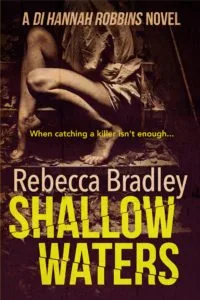Rebecca Bradley is a Professional Member of ALLi and bestselling author of police procedurals
Think that being a fiction writer excuses you from getting your facts as accurate as a non-fiction author? Think again! You owe it to your readers to check any facts you're not sure of, especially if you're writing about a setting or situation of which you do not have first-hand experience.
Brtish indie author Rebecca Bradley has a natural advantage for her chosen genre of crime fiction: she is a former police detective, so is super-sensitive to factual errors in police procedurals in particular. Here she explains why it's so easy for authors to slip up over details, throwing the reader out of the story, and suggests ways to avoid such errors.
Crime fiction – the most borrowed genre from libraries in the UK. It can be found high in the charts of whichever chart counter you follow: Amazon, paperback, hardback, a specific bookseller – crime sells.
Whether you are a reader or a writer of the genre, you will be aware of the difficult line that needs to be walked between fact and fiction. Why is this so difficult? Because readers know so much about the police process nowadays and getting it wrong, if there are police officers in the book, can completely ruin a reader’s experience.

(Image by Jacob Morch via Unsplash.com)
Drawing on Own Experience
As a retired police detective who reads a lot of crime fiction, as well as writes it, I can be a particularly difficult audience to please.
Though I do believe in suspending my disbelief when I pick up a book of any genre, there are some basic errors that really can throw me out of a crime novel and remind me that it is a book, a story I’m reading, and that I’m not actually in that world.
If you’re a crime writer, that’s not what you want to happen to your readers. You want to immerse them. Pull them along and keep them turning the pages unable to look away.
Being responsible for pushing them out of the story is the last thing you want.
A Catalogue of Errors
So, what are the errors I see regularly in crime fiction that could be easily corrected?
- My pet peeve is seeing female police officers referred to as WPCs. This still happens in books, and yet female officers haven’t been referred to in this way for many years. When I joined the job back in 1999 the phrase was already long gone. And yet, writers still insist on calling their female officers WPC. Why? I scream to myself in my head.
- Another common error is when a supervising officer is berating the protagonist and threatens them with demotion, or threatens to transfer them to a less prestigious department or even, Heaven forbid, loss of their job altogether. This just can’t happen. There are checks and balances to be done in the disciplining of a police officer. It’s a lengthy process. Yes, a supervisor may be very unhappy and can report them for any infraction of the police codes of conduct, but they can’t act on them alone. The professional standards department will take it on board or some other lengthy process will be started, depending on what it is you are dealing with.

Rebecca's police procedurals draw on her own professional experience
It was simple issues like this that made me ask myself, what could I do to help crime authors to not make such mistakes? I have over fifteen years’ service. seven years in uniform, and the rest as a detective in a specialist unit. I was frustrated. So, I set up a police procedural fact-checking business where authors can send me email questions, or a synopsis, or send me a completed manuscript to read through for me to complete a report on.
There is no need to have these simple errors in crime.
Not a lot of authors have access to a police officer for their research and even if they do, they probably don’t think to ask the simple questions like, “What do they call each other?” (It’s not officer!)
It Would Be a Crime Not To…

(Image by Praveesh Palakeel via Unsplash.com)
Crime is a great genre to read and write in. But it’s one of those genres where a little research really is needed, because there are a lot of cops out there who do read crime, and factual errors will throw them out of the book.
OVER TO YOU
- Whatever genre you write in, do you find there are specific areas that are prone to being misrepresented? Does it frustrate you? Or do you think readers should leave their disbelief at the door, no matter what they know to be true?
- What are your favourite resources for fact-checking in your genre?
OTHER POSTS ABOUT QUALITY ISSUES – from the ALLi Author Advice Center Archive






Hello there
I entirely agree with you, Rebecca. Glaring errors and/or character doing ridiculously unlikely things spoil the story.
My nephew is a policeman here in Australia. He says the way cops are portrayed holding their pistols with their arms outstretched is completely wrong too.
Another example of this is stories with Church characters. Nuns are almost always represented in film wearing habits and veils as they were 30-40 or more years ago! Other erroneous trappings that often go along with this are nuns wearing rosary beads around their necks and priests (such as Fr Brown in the popular British series based on G.K Chesterton’s novels) wearing post-Vatican II vestments.These glaring anachronisms are so annoying. Like you I scream to myself, ‘Why?’ when very basic research would have prevented this sloppiness!
On the other hand, I sometimes wonder if the detailed forensic information that is now commonly described in crime stories/films helps criminals avoid detection. It’s a tricky balance isn’t it?
I’ve just bought ‘Shallow Waters’ on the strength of this article. Thanks, Rebecca! (Book promotion works in mysterious ways…)
Interesting article Rebecca thanks and I agree for some fiction genres, especially those based on fact. I thought I was pretty safe letting my imagination run riot with my Afterlife Series. It was a big surprise when I received criticism for lack of adequate thought and research regarding ‘evidence’ of past lives. Apparently the reviewer’s idea of the afterlife is more accurate than mine! Live and learn eh?